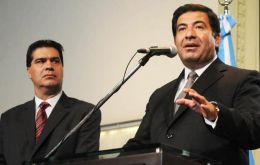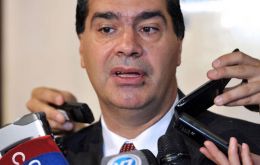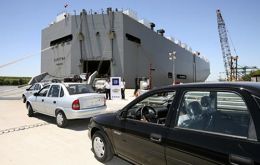MercoPress. South Atlantic News Agency
Tag: Central Bank of Argentina
-
Tuesday, January 28th 2014 - 05:05 UTC
Argentine market cautious reaction to new rules on foreign exchange and dollar savings

In what promises to be a week of surprises as the Argentine government unfolds measures to contain the price of the US dollar, this Monday the peso held relatively stable after last week's sharp devaluation. While the official rate remained unchanged at 8.01 Pesos for a greenback, in the parallel market it climbed to 12.15 Pesos.
-
Wednesday, December 4th 2013 - 02:50 UTC
Argentine central bank admits 'serious loss of reserves', which stand at 30bn

The newly appointed head of Argentina's Central bank Juan Carlos Fábrega admitted that in the last few months “loss of international reserves” has been serious, but “we are working to correct the situation”.
-
Tuesday, December 3rd 2013 - 21:06 UTC
Argentines will have to spend summer holidays at home; tourist dollar up 35%

In an attempt to stop the drain of Argentina Central Bank international reserves, the government of President Cristina Fernandez has decided to take the 20% income tax advance to 35% for all credit and debit card purchases made abroad. The move will also involve the purchase of dollars for Argentines travelling abroad with the US currency climbing now to 8.322 pesos.
-
Monday, December 2nd 2013 - 16:29 UTC
Argentina concerned with 'US and UK national debt and monetary basis'

Argentina's cabinet chief on Monday hit back at the United States reacting to comments from the White House on the Argentine central bank reserves saying he was worried about the US and UK debt levels, “the US debt reaches over 100% of GDP”.
-
Friday, April 19th 2013 - 02:51 UTC
Argentine international reserves fall below the 40bn dollars benchmark, 8% so far this year

Argentina’s Central bank international reserves have fallen below the 40bn dollars benchmark, which is the lowest in six years, according to the bank’s official data. So far this year the drain has been 3.48bn dollars and 12.84bn from the record 52.6bn of January 2011.
-
Saturday, September 15th 2012 - 05:13 UTC
Argentina’s money supply adjusted for inflation climbed 22.6% in last 12 months

A benchmark measure of Argentina's money supply rose 34.6% on the year in August, according to the central bank. In its monthly monetary report published late Thursday, the Central Bank of Argentina said its M2 measure of money supply averaged 403.93 billion Argentine pesos (86.6 billion dollars) last month.
-
Wednesday, July 4th 2012 - 23:21 UTC
Argentine economy forecasted to enter recession in second half, but could still end 2012 positive

The odds that Argentina's economy will enter a recession in the second half of this year held above 95% for a second consecutive month in the closely followed monthly leading indicator published by Torcuato Di Tella University, UTDT.
-
Friday, June 22nd 2012 - 08:40 UTC
Argentina experiences tighter trade surplus and slower industrial growth in May

Argentina’s trade surplus was 1.5 billion dollars in May, compared to 1.71bn a year earlier according to the official stats office Indec, while industrial production in the same month continued to languish, according to the medium estimate of more than 50 banks, economic research firms and universities surveyed by the Central Bank.
-
Friday, November 18th 2011 - 06:11 UTC
Argentine economic activity expands at steady pace, but signs of cooling

Argentine economic activity grew at a steady pace in October but there are signs that growth will cool in the coming months, local consultants Orlando J. Ferreres & Asociados, OJF, said Thursday.
-
Thursday, November 17th 2011 - 07:04 UTC
Top banker forecasts ‘dollar run’ in Argentina will dissolve: plenty of reserves

The former head of the Argentine Central Bank, Mario Blejer assured on Wednesday that in the exchange market “tension has been created which will only start to dissolve as and when we minimize the analysis of the subject.”
